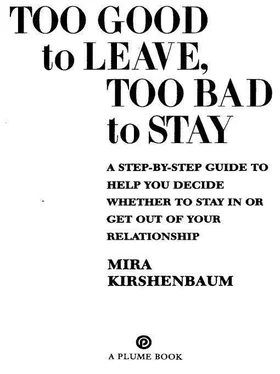Kirshenbaum, Mira - Too Good to Leave, Too Bad to Stay
Здесь есть возможность читать онлайн «Kirshenbaum, Mira - Too Good to Leave, Too Bad to Stay» весь текст электронной книги совершенно бесплатно (целиком полную версию без сокращений). В некоторых случаях можно слушать аудио, скачать через торрент в формате fb2 и присутствует краткое содержание. Жанр: Психология. Описание произведения, (предисловие) а так же отзывы посетителей доступны на портале библиотеки ЛибКат.
- Название:Too Good to Leave, Too Bad to Stay
- Автор:
- Жанр:
- Год:неизвестен
- ISBN:нет данных
- Рейтинг книги:3 / 5. Голосов: 1
-
Избранное:Добавить в избранное
- Отзывы:
-
Ваша оценка:
- 60
- 1
- 2
- 3
- 4
- 5
Too Good to Leave, Too Bad to Stay: краткое содержание, описание и аннотация
Предлагаем к чтению аннотацию, описание, краткое содержание или предисловие (зависит от того, что написал сам автор книги «Too Good to Leave, Too Bad to Stay»). Если вы не нашли необходимую информацию о книге — напишите в комментариях, мы постараемся отыскать её.
Too Good to Leave, Too Bad to Stay — читать онлайн бесплатно полную книгу (весь текст) целиком
Ниже представлен текст книги, разбитый по страницам. Система сохранения места последней прочитанной страницы, позволяет с удобством читать онлайн бесплатно книгу «Too Good to Leave, Too Bad to Stay», без необходимости каждый раз заново искать на чём Вы остановились. Поставьте закладку, и сможете в любой момент перейти на страницу, на которой закончили чтение.
Интервал:
Закладка:
To understand what it really means to trust your feelings, you have to understand how feelings work. Here’s a quick way of understanding this that I’ve found most helpful, not just professionally but personally as well.
Let’s go back about ten thousand years to visit our primitive ancestors. Here’s the sequence that will show the context in which feelings have their special place. It’s just one example, but the stages themselves are eternal:
Stage 1: Reality. A tiger is creeping toward you through the grass.
Stage 2: Perception. “A tiger is creeping toward me through the grass!”
Stage 3: A feeling. “Yikes!” Fear of tiger.
Stage 4: Action. You get your butt in gear and get the hell out of there.
Every feeling anyone’s ever had fits into this sequence. It makes clear how we get into trouble with our feelings. Notice that before we have the feeling “Fear of tiger” there should be a real tiger out there in the grass that we should be accurately perceiving.
There’s a lot of talk about respecting all feelings, but, let’s face it, you’re going to feel pretty stupid feeling “fear of tiger” when you are correctly perceiving something but it’s only, let’s say, some joker in a fiendishly well-made tiger suit. And you’re going to feel pretty stupid feeling “fear of tiger” when, like the proverbial hunter in deer season, you’re misperceiving what’s actually a zebra or a pussycat or a mother-in-law. No one can tell you what to feel, but for feelings to make sense they’ve got to be based on correctly perceiving something that’s real.
Love, like any other feeling, fits into this sequence:
Stage 1: Reality. There’s a person you meet and get to know. This person has real qualities.
Stage 2: Perception. “What a wonderful person with perfect qualities for me.”
Stage 3: A feeling. “I’m in love!”
Stage 4: Action. You get more and more involved.
Your saying “But I love him [her]” is only a description of your feelings. It’s not about what’s really out there or your perceptions of what’s out there. Love of John [or Jane] is a good thing, but only if you would actually feel love if you correctly perceived the real John [or Jane].
Feeling love doesn’t mean that your perceptions are accurate or that the realities warrant your feelings. In other words, feelings are not necessarily appropriate just because you have them. Ask any scam victim who was tricked into misperceiving realities that didn’t even exist in the first place.
STEP #11: YOU LIKE ME, YOU REALLY LIKE ME
If you’re one of those people being kept in relationship ambivalence by love, let me help you make sure your feelings of love make sense given your realities.
Of course this whole book is designed to help you with this, but what we can focus on here is not the other person but love itself, whether you’re really being stalked by the tiger of love or a paper tiger or a ghost tiger or no tiger at all.
Here’s one of the best ways I know to get at whether love is dead. This question may be as familiar as a thermometer, but like a thermometer it has amazingly powerful diagnostic properties:
Diagnostic question #11. In spite of admirable qualities, and stepping back from any temporary anger or disappointment, do you genuinely like your partner, and does your partner seem to like you?
Just so we’re clear, there are really two parts to question #11:
1. We’ve already established you don’t find your partner nasty or stupid or crazy or ugly or stinky. But do you genuinely like your partner? I’m not asking if you’d be friends with your partner exactly the way you’re friends with other people in your life. I’m not asking if you get along doing things like making meals or going shopping. I’m not asking if you like the same things. I’m not asking if this is always true every minute of every day. I’m just asking if, when it counts for you, you really like your partner the way you like a friend or someone else you feel comfortable and happy being with.
2. Does your partner seem to like you? I’m not asking you to get inside your partner’s head or heart. Instead I’m asking how your partner makes you feel about how he feels about you. Does your partner act as though he likes you? Does your partner make you feel he likes you? I know there are periods of anger and hurt and distance between you, but does your partner convey to you the sense that he likes you outside of these periods?
These aren’t always easy questions to answer. Let’s see what we can learn from some people I call the Couple Who Tried Too Hard.
Ann’s Story
Ann and Dave fell in love and married because they shared the same values. They met at a Quaker Meeting. They’d both been brought up as Quakers but had drifted away from it when they hit adolescence. They’d each been married briefly before to other people and they were trying to get back to their spiritual roots.
What initially drew them to each other was their discomfort with the political activism of some people at their Meetings. Ann and Dave were hungry for more spiritual experiences. When they first found each other, that hunger combined with the background they shared made it seem as though they were a perfect match: two good, kind, gentle, loving people hungry to connect with God, each comfortable knowing the other was right in his or her judgments.
In fact, they agreed so much and supported each other so strongly that, echoing Quaker ways of putting things, they got into the habit of constantly referring to each other as “my best friend.”
I’ll never forget the downright shame that burned in Ann’s face when she came to me wondering how she could be so unhappy in a “perfect marriage” to someone who was her “best friend” that she “loved with all her heart.” She didn’t make sense to herself. How could all this be true and yet all she thought about was wanting to leave Dave? Surely something would have to be terribly wrong somewhere, probably with her, she thought, probably with some emptiness or coldness or deadness or rage in her soul that was shutting her down to love.
This Can’t Be Love. Ann was perfectly willing to blame herself for anything and everything, but when I asked her to talk about her “best friend” the complaints poured out. Although she was careful to remember to point out the high values Dave had that she shared, she had nothing else good to say about him. Sure, he was eager to get close to God and heal the world, but to actually spend her days with, he was mean, complaining, cold, boring, disconnected from his feelings, uninterested in talking about their relationship. He couldn’t talk about anyone without putting them down. And if you asked him what time it was, he’d build you a watch.
“But I love him,” Ann said to me. “He’s not a bad person. Is there something wrong with me that I can’t stop wanting to leave him?”
This is actually a very common way people express their ambivalence. For them it’s not the person’s good qualities in one pile and bad qualities in the other. Instead it’s all their qualities, all bad, in one pile, and in the other just a general sense that they’re a good person and worthy of being loved.
The End of the Journey. I never know where these journeys are going to take me when I start, but the journey I went on with Ann kept leading me away from something being wrong with her. It led to Ann’s need to give herself permission to get clear about this relationship and act on that clarity.
Eventually we got to the question I just asked you. “Ann,” I said, “I know you’re a spiritual person and your values are very important to you, but speak from your gut feelings for a moment and tell me the truth. Do you like Dave? Do you have the sense that he likes you? I know you like the things he believes in that you agree with. But I’m remembering all the things you told me about him that aren’t the things you say about someone you like [and I gave her some examples]. So when you really search your heart for how you feel about Dave minute by minute as you go through your days, do you actually like him?”
Читать дальшеИнтервал:
Закладка:
Похожие книги на «Too Good to Leave, Too Bad to Stay»
Представляем Вашему вниманию похожие книги на «Too Good to Leave, Too Bad to Stay» списком для выбора. Мы отобрали схожую по названию и смыслу литературу в надежде предоставить читателям больше вариантов отыскать новые, интересные, ещё непрочитанные произведения.
Обсуждение, отзывы о книге «Too Good to Leave, Too Bad to Stay» и просто собственные мнения читателей. Оставьте ваши комментарии, напишите, что Вы думаете о произведении, его смысле или главных героях. Укажите что конкретно понравилось, а что нет, и почему Вы так считаете.












